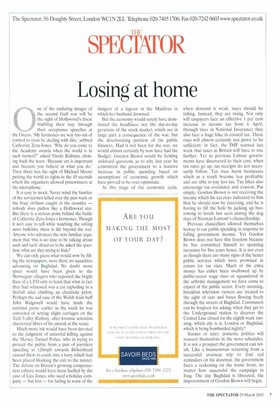Losing at home
0 ne of the enduring images of the second Gulf war will be the sight of Hollywood's finest ' blubbing their way through their acceptance speeches at the Oscars. 'My hormones are way too out of control to even be dealing with this,' sobbed Catherine Zeta-Jones. 'Why do you come to the Academy awards when the world is in such turmoil?' asked Nicole Kidman, choking back the tears, 'Because art is important and because you believe in what you do.' Then there was the sight of Michael Moore putting the world to rights in the 45 seconds which the organisers allowed prizewinners at the microphone.
It is easy to mock. Never mind the families of the servicemen killed over the past week or the Iraqi civilians caught in the crossfire — nobody does pathos like a Hollywood star. But there is a serious point behind the battle of Catherine Zeta-Jones's hormones. Though it isn't easy to tell while watching the rolling news bulletins, there is life beyond the war. Anyone who advances the now familiar argument that 'this is no time to be talking about such and such' deserves to be asked the question: what are they hying to hide?
We can only guess what would now be filling the newspapers, were there no squaddies advancing on Baghdad. No doubt more space would have been given to the Norwegian villagers who reported the bright flare of a UFO only to learn that what in fact they had witnessed was a cat exploding in a fireball after climbing an electricity pylon. Perhaps the sad case of the Welsh train buff John Ridgewell would have made the national press: earlier in the week he was convicted of setting alight carriages on the Teifi Valley Railway, after forensic scientists discovered fibres of his anorak at the scene.
Much more ink would have been devoted to the judgment of unlawful killing against the Mersey Tunnel Police, who in trying to protect the public from a pair of joyriders speeding at 120mph towards Birkenhead caused them to crash into a lorry which had been placed blocking the exit to the tunnel. The debate on Britain's growing compensation culture would have been fuelled by the case of Liza Jones, who sued a holiday company — but lost — for failing to warn of the dangers of a lagoon in the Maldives in which her husband drowned.
But the economy would surely have dominated the headlines: not the day-to-day gyrations of the stock market, which are in large part a consequence of the war, but the deteriorating position of the public finances. Had it not been for the war, we would almost certainly by now have had the Budget. Gordon Brown would be fielding awkward questions as to why last year he committed the government to a massive increase in public spending based on assumptions of economic growth which have proved to be over-optimistic.
At this stage of the economic cycle, when demand is weak, taxes should be falling. Instead, they are rising. Not only will taxpayers face an effective 1 per cent increase in income tax from 6 April, through rises in National Insurance; they also face a huge hike in council tax. These rises will almost certainly not prove to be sufficient; in fact, the IMF warned last week that taxes in Britain will have to rise further. Yet as previous Labour governments have discovered to their cost, when tax rates go up, tax receipts do not necessarily follow. Tax rises harm businesses which as a result become less profitable and are able to pay less tax. Tax hikes also encourage tax avoidance and evasion. Put simply, Gordon Brown is not receiving the income which his tax rises indicated to him that he should now be receiving, and he is having to fill the hole by jacking up borrowing to levels last seen during the dog days of Norman Lamont's chancellorship.
Previous chancellors allowed themselves leeway to cut public spending in response to falling government income. Yet Gordon Brown does not have this freedom because he has committed himself to spending increases for five years hence. It is not even as though there are many signs of the better public services which were promised in return for tax rises. Much of the extra money has either been swallowed up by public-sector wage rises or squandered in the arthritic management we have come to expect of the public sector. Every morning, breakfast television viewers are treated to the sight of cars and buses flowing freely through the streets of Baghdad. Commuters can be forgiven for asking, when they get to the Underground station to discover the Central Line closed for the eighth week running, which city is it, London or Baghdad, which is being bombarded nightly?
Sooner or later, domestic politics will reassert themselves in the news schedules. It is not a prospect the government can relish. Like a businessman returning from a successful overseas trip to find red reminders on his doormat, the government faces a reckoning on the home front, no matter how successful the campaign in Iraq. The day Baghdad is liberated, the imprisonment of Gordon Brown will begin.








































































 Previous page
Previous page